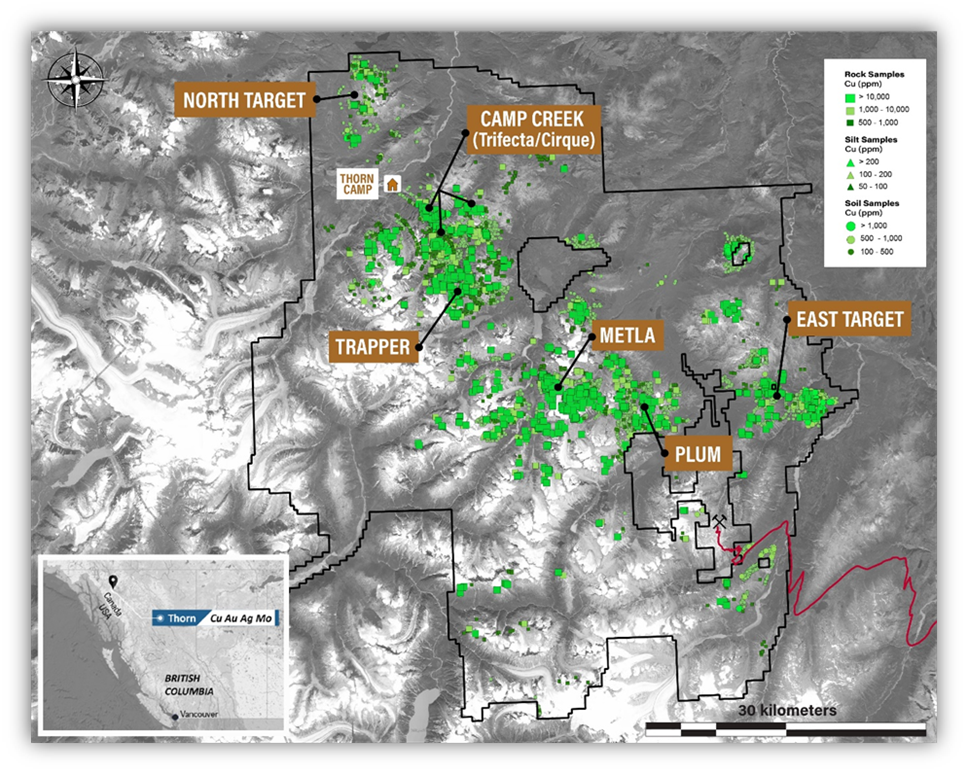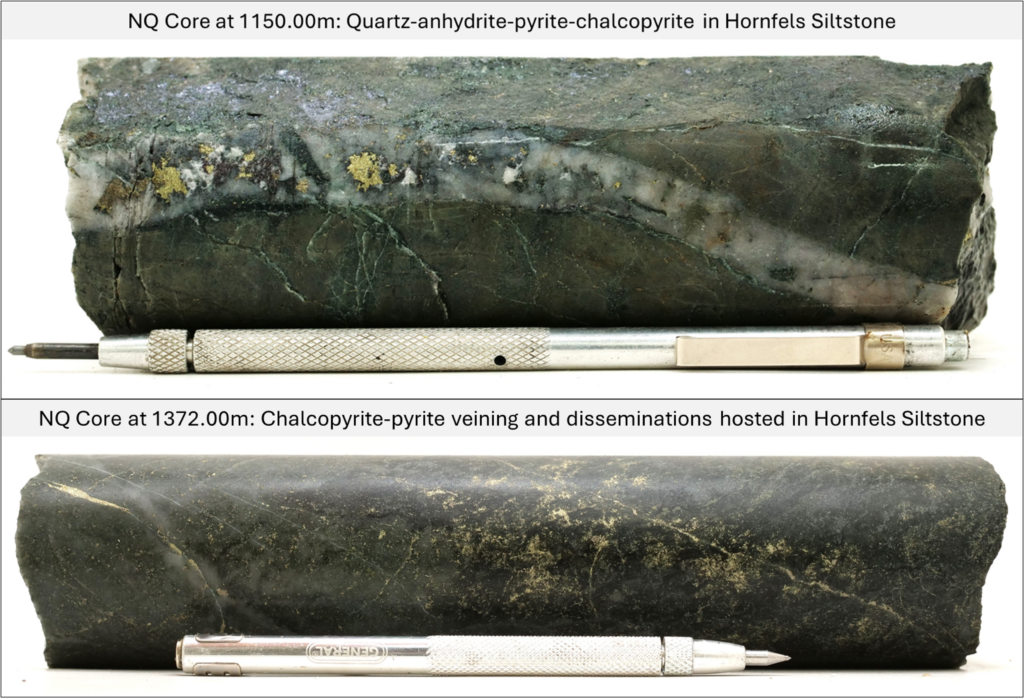Gold Zone: 61.5m of 0.89 g/t Gold Including 4.65m of 6.15 g/t Gold
Copper Zone: 1126.05m of 0.31% CuEq, Including Sub-intervals of 575.50m of 0.45% CuEq, 247.94m of 0.57% CuEq, 81.50m of 0.60% CuEq, 30.55m of 0.67% CuEq
August 6, 2024 – Brixton Metals Corporation (TSX-V: BBB, OTCQB: BBBXF) (the “Company” or “Brixton”) is pleased to announce its second drill hole results of the 2024 season from its wholly owned Thorn Project located in NW British Columbia, Canada. The Thorn Project is an underexplored copper-gold porphyry district with 16 large scale exploration target areas identified. Brixton is operating with two diamond drills and will continue drilling until the end of the season.
Highlights
- A gold dominant zone identified above porphyry-copper mineralization in hole THN24-291 from 116.50-178.00m represents a potential southwest extension to the high-sulphidation gold system of the Talisker Zone to a 900m strike length yielding:
- 61.50m of 0.89 g/t Au, 10.5 g/t Ag, 0.13% Cu
- Including 37.30m of 1.35 g/t Au, 16.1 g/t Ag, 0.21% Cu
- Including 11.00m of 3.53 g/t Au, 43.7 g/t Ag, 0.67% Cu
- Including 4.65m of 6.15 g/t Au, 61.9 g/t Ag, 0.96% Cu
- Copper dominant porphyry mineralization within THN24-291 begins at 397.95m depth and ended in mineralization at 1524m with increasing copper grades observed over the bottom 25m
- Hole THN24-291 intercepted broad zones of Cu-Au-Ag-Mo mineralization:
- 1126.05m 0.18% Cu, 0.05 g/t Au, 1.82 g/t Ag, 167 ppm Mo (0.31% CuEq)
- 575.50m of 0.27% Cu, 0.06 g/t Au, 2.32 g/t Ag, 266 ppm Mo (0.45% CuEq)
- 247.94m of 0.34% Cu, 0.10 g/t Au, 2.81 g/t Ag, 295 ppm Mo (0.57% CuEq)
- 55.94 of 0.44% Cu, 0.13 g/t Au, 3.60 g/t Ag, 253 ppm Mo (0.66% CuEq)
- 30.55m of 0.46% Cu, 0.13 g/t Au, 3.95 g/t Ag, 212 ppm Mo (0.67% CuEq)
- 21.00m of 0.38% Cu, 0.05 g/t Au, 2.62 g/t Ag, 456 ppm Mo (0.65% CuEq)
- Hole THN24-291 significantly extends the footprint of mineralized porphyry at Camp Creek towards the northwest
Vice President of Exploration, Christina Anstey, stated, “We are excited to announce that THN24-291 has expanded the known broad copper mineralization at the Camp Creek Porphyry Target and provided a 250-meter extension of the Talisker Gold Zone at the Thorn Project. We look forward to receiving additional assays from the Camp Creek drilling and some of the new multi-kilometer scale regional untested drill targets being explored during this fully funded season.”
Figure 1. Thorn Project Location Map with Copper Geochemistry.

Table 1. Select Intervals in Hole THN24-291 from the Gold Dominant Zone.

The true width of the mineralized intervals has not yet been determined.
Figure 2. THN24-291 Cross-Section and Plan Map for Camp Creek at -400m below sea level.

Table 2. Select Assay Intervals for Camp Creek Drill Hole THN24-291.

HQ and NQ size core samples were cut in half and sampled predominantly at 2.0m intervals. Assay values are weighted averages. The true width of the mineralized intervals has not yet been determined.
Copper Equivalent (CuEq) is calculated based on US$ 4.02/lb Cu, US$ 2105.6/oz Au, US$ 25.16/oz Ag, $US 20.99/lb Mo. These prices represent the approximate Metal prices and calculations assume 95% metal recoveries.
CuEq % = (Cu % + (0.764486* Au g/t) + (0.009134 * Ag g/t) + (0.000523 * Mo ppm)) * 0.95
Discussion
THN24-291 was collared 285m west from THN21-184 collar and drilled at an azimuth of 150 degrees with a dip of -82 degrees to a total depth of 1524.00m. The objective of hole THN24-291 was to test for the high-grade part of the system and to expand mineralization footprint to the northwest.
The gold zone in the upper section of hole 291 from 116.50-178.00m yielded 61.5m of 0.89 g/t Au, 10.5 g/t Ag, and 0.13% Cu represents the high-sulphidation part of the porphyry system and appears to reflect the southwest extension to the near surface Talisker Zone. Previous drill intercepts at Talisker include THN11-51 which intersected 49.78m of 1.41g/t Au, 19.00 g/t Ag, 0.25% Cu from 52.60m depth and THN04-29 which intersected 56.10m of 1.27g/t Au, 16.7g/t Ag, 0.19 Cu% from 21.80m depth. The Talisker gold zone has a strong Ag-As-Cu-Sb-Bi association coincident with the gold zone intercepted in hole 291, located 480m to the southwest from the gold intercept in hole THN11-51, and provides a potential new total strike length of the Talisker Zone of 900m. Gold mineralization is hosted within the upper Porphyry Z unit which is situated above Porphyry Y and Porphyry X units.
Figure 3. HQ Core from Hole THN24-291 from the Upper Gold Zone.

Hole THN24-291 was successful in extending Cu-Au-Ag-Mo mineralization both laterally and to depth in this area with meaningful higher grade sub-intervals within the 1126.05m of mineralization drilled. The hole ended in 21.00 meters of 0.65% CuEq well-mineralized siltstone (0.38% Cu, 0.05 g/t Au, 2.62 g/t Ag and 456 ppm Mo). Porphyry mineralization is hosted in the Cretaceous aged diorite Porphyry X unit, a crowded plagioclase porphyry characterized by well-defined stacked biotite, a feature typical of mineral-related porphyry phases. Mineralization is also hosted within Triassic Stuhini Group sedimentary rocks, which are intruded by the porphyry phases. Mineralization consists dominantly of chalcopyrite, molybdenite and pyrite as disseminations, fracture fill and within porphyry-style veins. Pyrite is dominate in the upper part of the hole with chalcopyrite and molybdenite mineralization increasing with depth. The majority of copper-molybdenum mineralization within hole 291 is hosted in the Triassic Stuhini Group sediments with Porphyry X comprising only 200m of the broader 1126m zone of mineralization (Figure 6). Alteration assemblages transition from advanced argillic at surface, into a pronounced zone of strong phyllic alteration and ultimately into potassic assemblages around the core of the system. Higher-grade mineralization typically occurs around the -400m below sea level. At this -400-level hole THN24-291 is spaced 95m west from previously reported holes 184 and 152m north from hole 201, (see plan map in Figure 2) and constitutes a significant step-out from previous drilling to the West and Northwest.
Figure 4. Core Photographs of Copper Mineralization Observed in THN24-291.

Figure 5. Core Photographs of Copper Mineralization in Hole THN24-291.

Figure 6. Strip-Log of Hole THN24-291 for Geological Units and Cu-Au-Ag-Mo distribution.

Table 3. Collar Information for Hole THN24-291.

Quality Assurance & Quality Control
Quality assurance and quality control protocols for drill core sampling was developed by Brixton. Core samples were mostly taken at 1.0 to 2.0m intervals. Blank, duplicate (lab pulp) and certified reference materials were inserted into the sample stream for at least every 20 drill core samples. Core samples were cut in half, bagged, zip-tied and sent directly to ALS Minerals preparation facility in Whitehorse, Yukon or Langley, British Columbia depending on available lab capacity. ALS Minerals Laboratories is registered to ISO 9001:2008 and ISO 17025 accreditations for laboratory procedures. Samples were analyzed at ALS Laboratory Facilities in North Vancouver, British Columbia for gold by fire assay with an atomic absorption finish, whereas Ag, Pb, Cu and Zn and 48 additional elements were analyzed using four acid digestion with an ICP-MS finish. Over limits for gold were analyzed using fire assay and gravimetric finish. The standards, certified reference materials, were acquired from CDN Resource Laboratories Ltd., of Langley, British Columbia and the standards inserted varied depending on the type and abundance of mineralization visually observed in the primary sample. Blank material used consisted of non-mineralized siliceous landscaping rock. A copy of the QAQC protocols can be viewed at the Company’s website.
Qualified Person (QP)
Mr. Corey A. James, P.Geo., is a Senior Project Geologist for the Company who is a qualified person as defined by National Instrument 43-101. Mr. James has verified the referenced data and analytical results disclosed in this press release and has approved the technical information presented herein.
About Brixton Metals Corporation
Brixton Metals is a Canadian exploration company focused on the advancement of its mining projects. Brixton wholly owns four exploration projects: Brixton’s flagship Thorn copper-gold-silver-molybdenum Project, the Hog Heaven copper-silver-gold Project in NW Montana, USA, which is optioned to Ivanhoe Electric Inc., the Langis-HudBay silver-cobalt-nickel Project in Ontario and the Atlin Goldfields Project located in northwest BC which is optioned to Eldorado Gold Corporation. Brixton Metals Corporation shares trade on the TSX-V under the ticker symbol BBB, and on the OTCQB under the ticker symbol BBBXF. For more information about Brixton, please visit our website at www.brixtonmetals.com.
On Behalf of the Board of Directors
Mr. Gary R. Thompson, Chairman and CEO
For Investor Relations inquiries please contact: Mr. Michael Rapsch, Senior Manager, Investor Relations. email: michael.rapsch@brixtonmetals.com or call Tel: 604-630-9707
Neither the TSX Venture Exchange nor its Regulation Services Provider (as that term is defined in the policies of the TSX Venture Exchange) accepts responsibility for the adequacy or accuracy of this release.
Information set forth in this news release may involve forward-looking statements under applicable securities laws. Forward-looking statements are statements that relate to future, not past, events. In this context, forward-looking statements often address expected future business and financial performance, and often contain words such as “anticipate”, “believe”, “plan”, “estimate”, “expect”, and “intend”, statements that an action or event “may”, “might”, “could”, “should”, or “will” be taken or occur, including statements that address potential quantity and/or grade of minerals, potential size and expansion of a mineralized zone, proposed timing of exploration and development plans, or other similar expressions. All statements, other than statements of historical fact included herein including, without limitation, statements regarding the use of proceeds. By their nature, forward-looking statements involve known and unknown risks, uncertainties and other factors which may cause our actual results, performance or achievements, or other future events, to be materially different from any future results, performance or achievements expressed or implied by such forward-looking statements. Such factors include, among others, the following risks: the need for additional financing; operational risks associated with mineral exploration; fluctuations in commodity prices; title matters; and the additional risks identified in the annual information form of the Company or other reports and filings with the TSXV and applicable Canadian securities regulators. Forward-looking statements are made based on management’s beliefs, estimates and opinions on the date that statements are made and the Company undertakes no obligation to update forward-looking statements if these beliefs, estimates and opinions or other circumstances should change, except as required by applicable securities laws. Investors are cautioned against attributing undue certainty to forward-looking statements.
